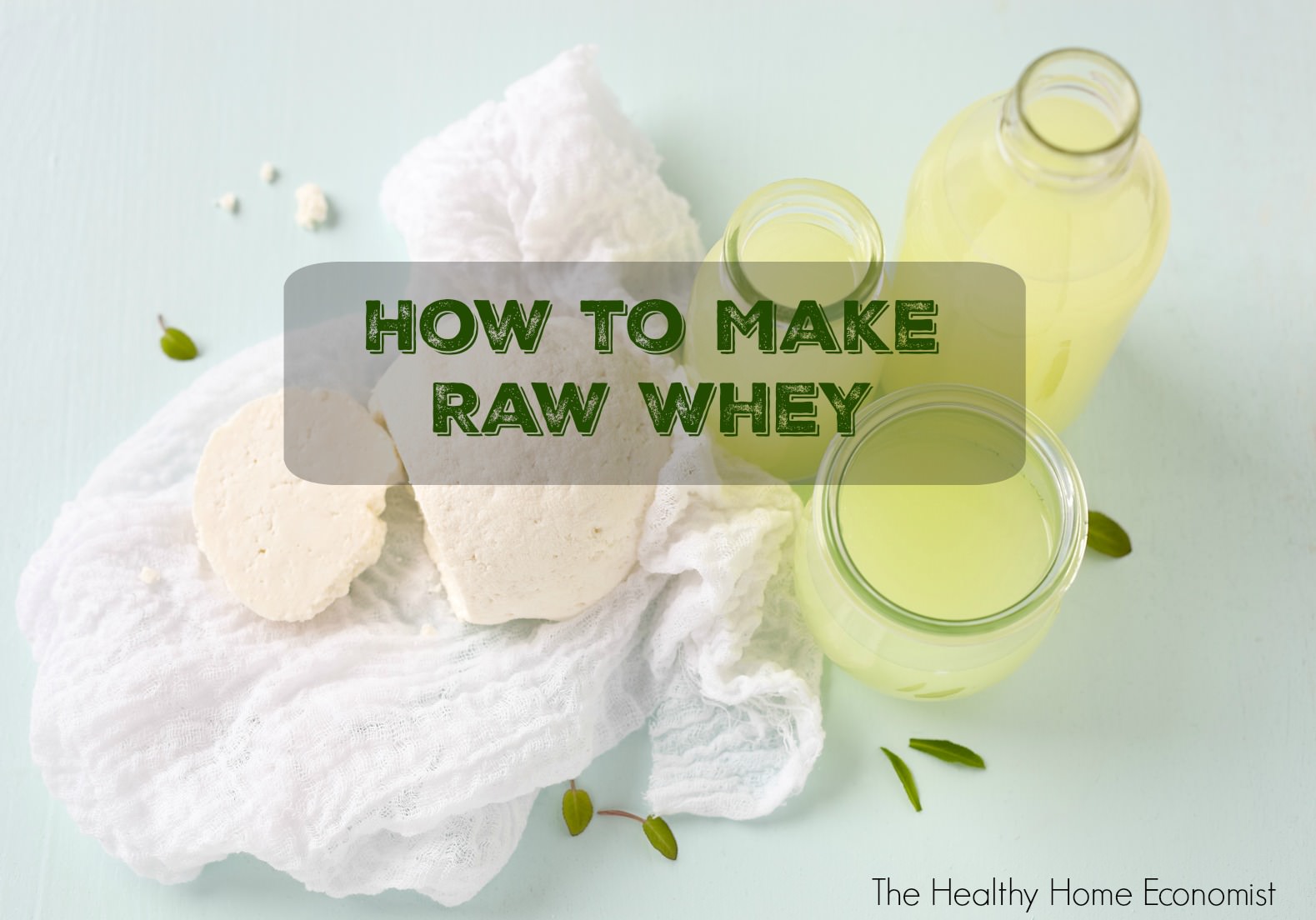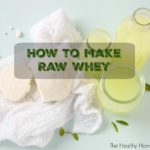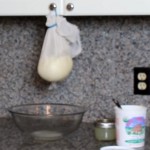How to make raw, enzyme and probiotic-rich liquid whey to use as a starter culture for all your home fermentation needs.

Do you know how to make whey from yogurt, kefir or raw milk?
A by-product of this simple technique is healthy homemade cream cheese that is loaded with enzymes and probiotics.
The recipe below describes how with visual instructions via video demonstration!
Making homemade baby formula? I recommend using this “quick whey” no straining method as the fastest and easiest approach.
How to Make Whey the REAL Way
Making real, liquid, nutrient rich, unadulterated whey in your own kitchen is a MUST step for any traditional cook to learn.
Without whey in its whole, liquid form, many other traditional recipes cannot even be attempted. You cannot buy whey from the store except in a denatured, unhealthy, powdered whey form. It is worth your time to learn what I show you in the video below.
Other video lessons on this blog show you how to use this whole food form of whey to make many delicious, healthful recipes for your family. Whey as made in the video demo below will keep up to 6 months in the refrigerator in a sealed mason jar.
If you absolutely have no access to farm fresh milk to make whole, unadulterated, enzyme rich whey, then you can use plain, organic yogurt brand from the store instead. Here are tips on how to spot the best yogurt brands.
The process is basically exactly the same thing as shown in the video.
You won’t get nearly as much whey using yogurt as clabbered, farm fresh milk, but at least you can get enough to get you started.
Wonderful Whey and REAL Cream Cheese
The raw, enzyme-rich cream cheese I make in the recipe video below is fantastic on a sprouted or sourdough bagel for breakfast. Don’t buy the Ezekiel sprouted muffins as they contain soy. This low-carb bagel recipe is another great one to try.
If you prefer to buy, these sourdough bagels are available for shipping freshly made to your door.
To make, just take your cream cheese left over from making liquid whey and add a few strawberries and a dash of dark maple syrup to taste. Mix together by pulsing a few times in your food processor. This wonderful, fresh, REAL strawberry cream cheese will last one to two weeks in the refrigerator. Another wonderful use for this healthy raw cheese is to make an easy no bake cheesecake.
No access to raw milk where you live? No problem. Check out this recipe plus video on how to separate whey from yogurt purchased from the store.
Cloudy Whey vs Clear Whey
No matter whether your whey turns out cloudy or clear, it is safe and fine to use in all your favorite recipes. This article explains why sometimes whey is cloudy compared to its usual golden color.

Raw Whey Recipe
How to separate raw, liquid whey from clabbered milk. The process also creates probiotic rich cream cheese.
Ingredients
- 1 quart raw milk preferably grassfed
- 1 large glass bowl
- 1 large rubber band
- 1 white dishtowel
Instructions
-
Allow the raw milk to sit on the counter for 1-3 days at room temperature.
-
When the milk separates into curds and whey (transforms into clabbered milk) you are ready to proceed. Note that the fresher the raw milk and the colder the temperature of your house, the longer it will take the raw milk to clabber.
-
Line a clean, large glass bowl with a clean, white dishtowel that isn’t too thick. Cheesecloth will also work, but the holes in the mesh must be very small, else the milk curds will pass through.
-
Gently pour the clabbered milk into the middle of the dish towel. Gather up the ends and fasten with a rubber band. Attach to a knob on an upper cabinet in your kitchen as shown in the picture.

-
Let the raw whey drip into the bowl underneath. This process will continue for an hour or two.
-
After the dripping stops, gently take down the hanging bag and place it into a clean bowl. Scrape out the raw cream cheese that is inside the bag, put in a container with a lid and refrigerate.
-
Pour the liquid whey from the dripping bowl into a glass mason jar, afix the lid and refrigerate.
-
Refrigerated, raw cream cheese will be good to eat for about a week. Raw whey will last several months refrigerated.
Recipe Video
How to Use Whey in Recipes
How to Make Ricotta Three Ways (plus Video How-to)
Perfect Probiotic Cottage Cheese
Cheese Making: Common Problems and Solutions








I have a question, I used to make this years ago and I’m convinced it helped cure my asthma along with a few other changes. I thought I used whey drained from yogurt though. So I wonder if that isn’t the best way? Or does the whey from yogurt work just as well?
Thanks!
There are several ways to make raw whey. Yes, straining yogurt is one of them (but not the best or most probiotically active result). https://www.thehealthyhomeeconomist.com/homemade-fresh-whey-five-methods/
Hey do you have the nutrition facts for the liquid whey? I want to see how much to take as an equivalent to a scoop of the store-bought protein powder.
It would be far to high in milk sugars to get the equivalent amount of protein in a scoop of processed whey powder. I suggest collagen powder, cottage cheese, or nutritional yeast blended into a smoothie for a natural protein boost to eliminate the toxic protein powders.
My whey smelled fine, but my creamed cheese smelled and tasted like vomit…! Where did I go wrong?
Either the milk was clabbered too long on the counter or the milk was too old when you clabbered it.
Sarah, I have a 3/4 gallon of 2% milk that I’ve had sitting out on my counter for about a month (an experiment, at this point), since it started to sour (Home temperature approximately 65-78 degrees). I have approximately 2 pints of whey, and the clabbored milk on top isn’t moldy, and some milk sediment has settled to the bottom. I smelled it today, and it does not smell bad, should I toss it, or is any of if still usable?
I also have some soured 2% milk that’s been in the fridge for 2 months. Can I use the whey or clabbored milk for anything? Maybe for a starter, for fermenation of something? Thanks!
Can’t get raw cream but can get raw milk for baby formula. Can cream be removed from milk and rest of milk be used to make whey?
You can remove the cream from the top of the milk for the formula (use a turkey baster), but you will need to use a fresh gallon of milk with the cream intact for the formula. The milk with the cream removed can be used to make yogurt or something else.
Is it normal for the separated whey and cream cheese to have a funky (kinda BO) smell to it? Even after I mixed strawberries and maple syrup with the cream cheese I could still smell/taste the odor. Did I do something wrong? My milk clabbered, but it took 6 days to do so, maybe that’s too long… any advice would be appreciated. Thank you!
When leaving raw milk on the counter, is it sealed with a lid or covered by a semipermeable membrane like a cheese cloth? Not sure what is best to facilitate the fermentation process. Thanks!
If a person had their own freeze dryer, could they freeze dry their whey and would it still be good to use compared to the store bought whey powder?
No, whey cannot be dried as the proteins are very fragile and denature easily.
If I left lightly pasteurized milk in the fridge for a while and it clabbered, can the curds and whey still be used?
Hmmm. Interesting and thank you. There are a million uses for clabbered milk. (Start your own terroir cheese culture) Best cornbread ever, my mom sips a little every day for the probiotics, chickens love it. BTW my wife and I have a raw milk micro dairy.